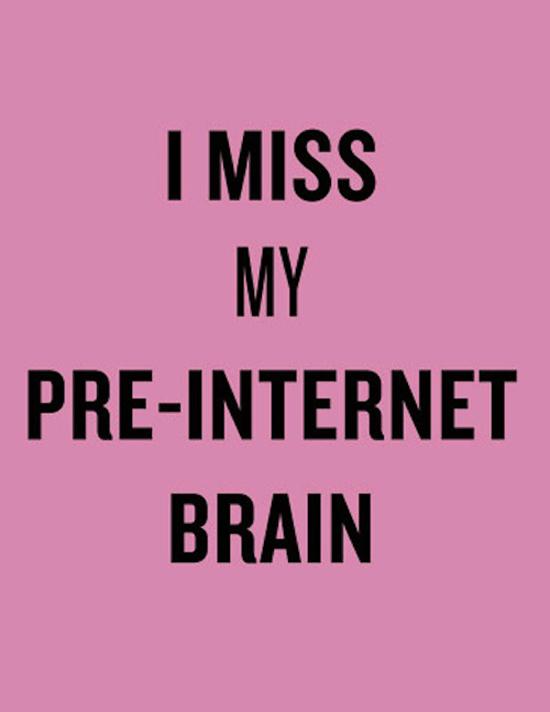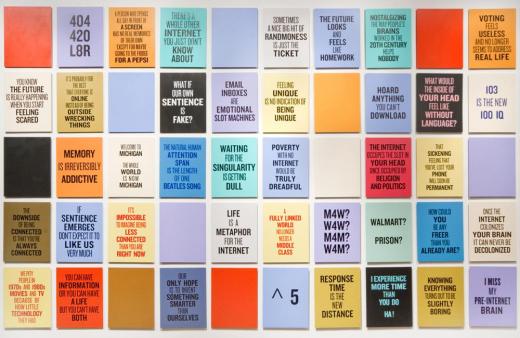Douglas Coupland: "Space Junk" / "Slogans for the Early Twenty-First Century"
Douglas Coupland: "Space Junk" / "Slogans for the Early Twenty-First Century"

Last week the Berlin-based transmediale festival gathered an impressive array of creative thinkers to celebrate our contemporary post-digital culture, while critically valorizing its latest outcomes and repercussions. The main focus was on the concept of the 'afterglow' as the current post-digital state in which the utopian promises of high-tech future crumble before our screen-glared eyes, and treasures swiftly turn into trash.
Douglas Coupland, the prolific pop culture guru, author, thinker, visual artist, and designer participated with a lecture "Space Junk“ at the Canadian Embassy, and the exhibition "Slogans for the Early Twenty-First Century“ at the Or Gallery.

Through the spirit of ‘McLuhanism’ and the core concept of the festival, in his lecture Coupland idiosyncratically dissected the contemporary experience of using technology and proposed a few possible directions it might take in the near future. The ease with which he illustrated the issues of today's society versus technology and its future met with deep unease of the paradox we live in. Although we intuitively know what the future holds for us (for, as Marshall McLuhan said, the ability to prophesy the future is simply the ability to look at the present), we mostly do not care about it while being well tucked in the comfort zone of our extended digital presence. Coupland faced us with the real disappointment: people, not the technology. We are basically spoiled by the amount and availability of information, unimpressed by the magic possibilities provided by technology, and disenchanted with the promises it failed to fulfill. Coupland backs this up with vivid examples – what if we could download the entire internet on a USB stick and have all the knowledge available at all times? A likely answer is: we probably would not care and our personal knowledge would not expand all that much. And what if we turn the tables and imagine a scenario in which our smart computers diligently collected all of our data? They would eventually create a virtual clone far more superior than us, and at some point we would not be needed anymore. After a series of his bitter jokes told in a manner of a nervous stand-up comedian, it seemed as if the idea settled among the audience and everyone mentally ran a trial version of their own, truly scary, dystopian super-me.
The pop culture genius who defined the 'Generation X' in the early nineties cleverly came up with the name for this digital doppelgänger to emerge with the coming generation – a 'cloudgänger'. Unsettlingly so, it is more than a plausible concept with a catchy name – it is a currently ongoing process that creepily takes over humans' lives. We can only nod to his conclusion that the cloudgänger (arbitrarily named Todd) is "in you, Todd is all around you, he is certainly in your trash can, and he will one day transcend you."

Image courtesy of transmediale
The ongoing body of statements displayed in Coupland’s current exhibition, “Slogans for the Early 21st Century", at the Or Gallery left the same haunting self-deprecating echo. The artist made a consistent effort to extract the differences between the twenty-first century mind as opposed to the twentieth, and expressed it in a popular format. The eighty slogans mostly revolve around internet culture and social online language, while concisely summing up the dominant state of mind shaped by their influence. Again, the obvious made me laugh and choke, and some of the statements resonated deeply. The show acknowledges that, even though often unaware of it, we all carry the messy leftovers of the excessive digitalisation. With today’s degraded standards of communication and our technical devices dictating the new rules of interpersonal relationships, "Response time is the new distance", as one of the pieces in the show puts it aptly. And, sadly, it is often the case that "Real time feels like neither". According to Coupland, the future will only bring us less individuality, interest, and sensitivity, while at the same time connecting us virtually to an extent we could not imagine or morally accept before. Perhaps the boldest of artist's premonitious statements is that we are the last generation to die, and our only hope is to invent something smarter than ourselves. Whether you feel this slightly depressive anti-digital wave or not, it is highly unlikely that none of these statements apply to your everyday life. I don't know about you, but I know that "I miss my pre-internet brain".